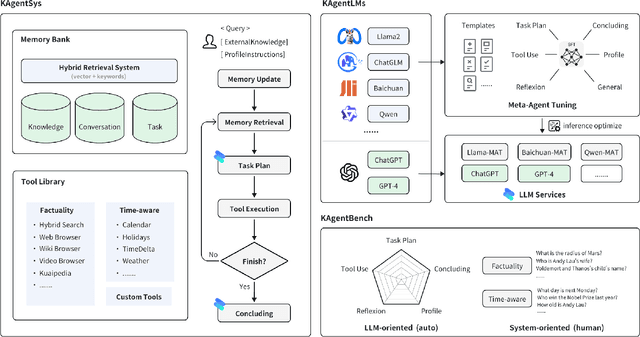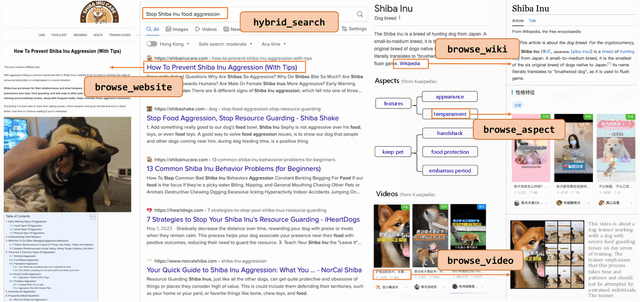Zepeng Zhai
Rewards as Labels: Revisiting RLVR from a Classification Perspective
Feb 05, 2026Abstract:Reinforcement Learning with Verifiable Rewards has recently advanced the capabilities of Large Language Models in complex reasoning tasks by providing explicit rule-based supervision. Among RLVR methods, GRPO and its variants have achieved strong empirical performance. Despite their success, we identify that they suffer from Gradient Misassignment in Positives and Gradient Domination in Negatives, which lead to inefficient and suboptimal policy updates. To address these issues, we propose Rewards as Labels (REAL), a novel framework that revisits verifiable rewards as categorical labels rather than scalar weights, thereby reformulating policy optimization as a classification problem. Building on this, we further introduce anchor logits to enhance policy learning. Our analysis reveals that REAL induces a monotonic and bounded gradient weighting, enabling balanced gradient allocation across rollouts and effectively mitigating the identified mismatches. Extensive experiments on mathematical reasoning benchmarks show that REAL improves training stability and consistently outperforms GRPO and strong variants such as DAPO. On the 1.5B model, REAL improves average Pass@1 over DAPO by 6.7%. These gains further scale to 7B model, REAL continues to outperform DAPO and GSPO by 6.2% and 1.7%, respectively. Notably, even with a vanilla binary cross-entropy, REAL remains stable and exceeds DAPO by 4.5% on average.
Beyond the Next Token: Towards Prompt-Robust Zero-Shot Classification via Efficient Multi-Token Prediction
Apr 04, 2025



Abstract:Zero-shot text classification typically relies on prompt engineering, but the inherent prompt brittleness of large language models undermines its reliability. Minor changes in prompt can cause significant discrepancies in model performance. We attribute this prompt brittleness largely to the narrow focus on nexttoken probabilities in existing methods. To address this, we propose Placeholding Parallel Prediction (P3), a novel approach that predicts token probabilities across multiple positions and simulates comprehensive sampling of generation paths in a single run of a language model. Experiments show improved accuracy and up to 98% reduction in the standard deviation across prompts, boosting robustness. Even without a prompt, P3 maintains comparable performance, reducing the need for prompt engineering.
KwaiAgents: Generalized Information-seeking Agent System with Large Language Models
Dec 08, 2023



Abstract:Driven by curiosity, humans have continually sought to explore and understand the world around them, leading to the invention of various tools to satiate this inquisitiveness. Despite not having the capacity to process and memorize vast amounts of information in their brains, humans excel in critical thinking, planning, reflection, and harnessing available tools to interact with and interpret the world, enabling them to find answers efficiently. The recent advancements in large language models (LLMs) suggest that machines might also possess the aforementioned human-like capabilities, allowing them to exhibit powerful abilities even with a constrained parameter count. In this paper, we introduce KwaiAgents, a generalized information-seeking agent system based on LLMs. Within KwaiAgents, we propose an agent system that employs LLMs as its cognitive core, which is capable of understanding a user's query, behavior guidelines, and referencing external documents. The agent can also update and retrieve information from its internal memory, plan and execute actions using a time-aware search-browse toolkit, and ultimately provide a comprehensive response. We further investigate the system's performance when powered by LLMs less advanced than GPT-4, and introduce the Meta-Agent Tuning (MAT) framework, designed to ensure even an open-sourced 7B or 13B model performs well among many agent systems. We exploit both benchmark and human evaluations to systematically validate these capabilities. Extensive experiments show the superiority of our agent system compared to other autonomous agents and highlight the enhanced generalized agent-abilities of our fine-tuned LLMs.
Kuaipedia: a Large-scale Multi-modal Short-video Encyclopedia
Nov 03, 2022Abstract:Online encyclopedias, such as Wikipedia, have been well-developed and researched in the last two decades. One can find any attributes or other information of a wiki item on a wiki page edited by a community of volunteers. However, the traditional text, images and tables can hardly express some aspects of an wiki item. For example, when we talk about ``Shiba Inu'', one may care more about ``How to feed it'' or ``How to train it not to protect its food''. Currently, short-video platforms have become a hallmark in the online world. Whether you're on TikTok, Instagram, Kuaishou, or YouTube Shorts, short-video apps have changed how we consume and create content today. Except for producing short videos for entertainment, we can find more and more authors sharing insightful knowledge widely across all walks of life. These short videos, which we call knowledge videos, can easily express any aspects (e.g. hair or how-to-feed) consumers want to know about an item (e.g. Shiba Inu), and they can be systematically analyzed and organized like an online encyclopedia. In this paper, we propose Kuaipedia, a large-scale multi-modal encyclopedia consisting of items, aspects, and short videos lined to them, which was extracted from billions of videos of Kuaishou (Kwai), a well-known short-video platform in China. We first collected items from multiple sources and mined user-centered aspects from millions of users' queries to build an item-aspect tree. Then we propose a new task called ``multi-modal item-aspect linking'' as an expansion of ``entity linking'' to link short videos into item-aspect pairs and build the whole short-video encyclopedia. Intrinsic evaluations show that our encyclopedia is of large scale and highly accurate. We also conduct sufficient extrinsic experiments to show how Kuaipedia can help fundamental applications such as entity typing and entity linking.
 Add to Chrome
Add to Chrome Add to Firefox
Add to Firefox Add to Edge
Add to Edge